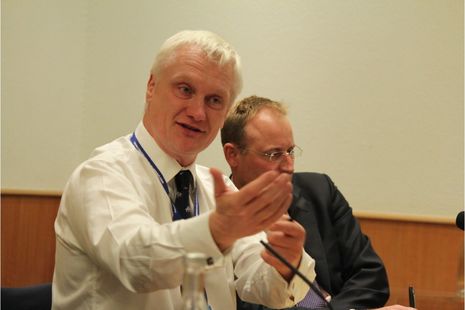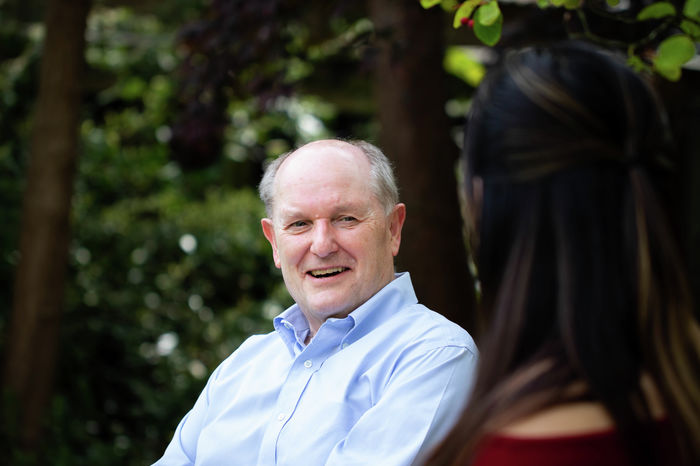From failing his degree to becoming an MP: Graham Stuart’s unorthodox time at Cambridge
Vienna Kwan sits down with Graham Stuart to hear his unconventional path from Selwyn College to Parliament without a degree

In the late 1800s, Lord Curzon failed to obtain a first class degree at Oxford. Instead, the future politician and Oxford Chancellor pledged to devote the rest of his life to “showing the examiners that they have made a mistake.”
Curzon’s was an extreme reaction, but not achieving good grades, or worse still failing, is a common fear among Oxbridge students. This was not the case for Graham Stuart, who matriculated in 1982 to study Philosophy and Law at Selwyn College.
Stuart’s original plan was straightforward: study at Cambridge, become a barrister, then become a politician. He threw Philosophy into the mix to “put off the grinding, grueling, potential tedium of law”. This was probably the first sign that his plan would not hold up.
Upon arriving at Cambridge, Stuart found the most time-consuming extracurriculars he could to distract him from his degree. He was captain of the Selwyn College Boat Club (SCBC) and chairman of the Cambridge University Conservative Association (CUCA), marking the start of his political journey. As captain of SCBC, he even persuaded a former boat race rower, recent Selwyn grad, and up-and-coming TV comedian Hugh Laurie to coach the team for a while. Rowing was a big part of Stuart’s Cambridge journey, and he was on track to make the University crew, but he “screwed up getting into the CUBC squad in my third year.” To this day, it is a “regret” that remains: “I can’t believe I messed that up,” he professes.
“I didn’t do it…I failed my degree”
At the end of his first year, Stuart and his friends created a ‘What’s On in Cambridge’ magazine guide, which served as an even bigger distraction from philosophising and lawyering. “It was paying me more than a banquet, so I thought, I might as well be an entrepreneur rather than a lawyer.” In fact, Stuart reckons his time as an undergraduate was “the wealthiest I’ve ever been, relatively speaking.” Running his business from his Selwyn accommodation meant there were no overhead costs. As a student entrepreneur, he was making a mindboggling “£200 a week” in 1983 – around £717 in today’s economy.
While his “friends went and studied hard and got firsts,” Stuart only “glimpsed at what a good dissertation I could do, if only I had the time,” focusing on his extracurricular and business ventures instead. So he accepted his fate: “I didn’t do it…I failed my degree”.
Upon a return to Selwyn as chairman of the education select committee, Stuart’s former director of studies John Spencer told him that failing “doesn’t seem to have done you any harm, Graham.” To which Stuart replied, “John, I never thought it would.”
Maybe this is the confidence we all need to take on life, but Stuart doesn’t recommend his approach for others. His “council house father from Glasgow, who had to teach himself physics in order to ever have a chance of doing medicine” certainly wasn’t happy with his whimsical approach to his workload. “Your parents won’t thank you for not getting your Cambridge degree, so I’d stay on there.” Stuart acknowledges that his journey wasn’t smooth sailing: “It’s quite pressurised, really, because there’s no fallback […] no safety net.”
“Your parents won’t thank you for not getting your Cambridge degree, so I’d stay on there”
Although he later expanded his print media business – launching and buying several magazines like Hot Water Magazine and Sailing Today Magazine – his “heart was always much more in politics.” After university, “just when I got the business to the point that it was […] making good money […] I immediately quit,” abandoning all distractions to pursue what he believed was his “true calling”.
Stuart stood in the 2001 General Election in the Cambridge constituency, while serving in the Cambridge City Council, but was unsuccessful. In 2005, he became MP for Beverley and Holderness, a seat he has held ever since.
In Parliament, Stuart enjoyed a merry-go-round of sacking, resignation, and appointment to the governments of Theresa May, Boris Johnson, Liz Truss and Rishi Sunak. Before going through the parliamentary cycle of cabinet reshuffles, he was a backbencher during David Cameron’s government. Despite having supported Cameron, he “used every opportunity I ever found to tell him where I thought he was going wrong.”
When asked about the awkwardness of cabinet reshuffles, Stuart’s accent transforms as he attempts his best – and it is very good – Boris Johnson impression. Johnson “got rid” of him as minister of exports in one quick phone call. “I could sort of mentally visualise him ruffling his hair: ‘Oh Graham, Graham. This is so uncomfortable. So much easier if you’ve done a bad job. You’ve done a great job. That really, really […] if you could find it within yourself to step aside from now.’ So, anyway, that was classic Boris.” Johnson brought Stuart back as minister for security later on, but it was “short-lived.”
“Three impossible options and a deadline by tomorrow: welcome to government”
Under Truss, he was energy minister. As part of that “infamous mini budget,” Stuart was in charge of “the massive subsidy of every single energy bill in the United Kingdom.” “I found myself having to administer that […] against an extraordinary time frame” and having to choose between “utterly unpalatable options.” Stuart winces as he recalls his time as minister during the mini-budget. Three impossible options and a deadline by tomorrow: welcome to government.
Perhaps Stuart’s time as captain of the Boat Club equipped him to handle the energy crisis. Perhaps his failed degree equipped him to remain calm in the chaos of cabinet reshuffles. Perhaps his entrepreneurial risk-taking prepared him for each election he has stood in.
 News / Colleges charge different rents for the same Castle Street accommodation2 March 2026
News / Colleges charge different rents for the same Castle Street accommodation2 March 2026 News / King’s hosts open iftar for Ramadan3 March 2026
News / King’s hosts open iftar for Ramadan3 March 2026 Theatre / Lunatics and leisure centres 4 March 2026
Theatre / Lunatics and leisure centres 4 March 2026 News / Angela Merkel among Cambridge honorary degree nominees27 February 2026
News / Angela Merkel among Cambridge honorary degree nominees27 February 2026 News / News in Brief: waterworks, wine woes, and workplace wins 1 March 2026
News / News in Brief: waterworks, wine woes, and workplace wins 1 March 2026








